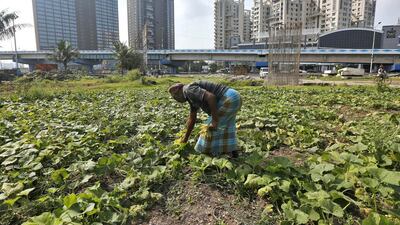MUMBAI // Business leaders in India and the UAE gave their backing to the republic’s keenly watched budget yesterday.
India’s budget focused on boosting the rural economy, while also trimming the deficit.
The Indian finance minister outlined his plans to support the country’s agricultural and rural economies in his third budget, including an attempt to double farmers’ incomes in the next five years.
Faizal Kottikollon, the chairman of the UAE-based diversified conglomerate, KEF Holdings, with projects worth Dh900 million under way in India, said the budget was “a step in the right direction” towards addressing some of the country’s most pressing challenges, including rural development.
“Largely, it is a prudent budget,” he said. “The big push towards infrastructure spending, the allocation of 2.18 trillion rupees [Dh117.1bn] for the building of roads and railways, will particularly drive much-needed development in the country.”
Mr Jaitley said that he was presenting the budget for the financial year between April 2016 and March 2017 at a time of “serious crisis” for the global economy, including slowing global growth and “battered” financial markets.
“Amid all these global headwinds, the Indian economy has held its ground firmly,” he said.
The budget is of particular interest to UAE business heads following the visit of Sheikh Mohammed bin Zayed, the Crown Prince of Abu Dhabi and Deputy Supreme Commander of the UAE Armed Forces, to India last month, which paved the way for even stronger economic and trade ties between the two countries.
Indian business leaders have called for the government to speed up economic reforms and improve infrastructure and the ease of doing business.
“The specific measures to improve ease of doing business and favourable tax treatment for start-ups and MSMEs [micro, small, and medium enterprises] will go a long way in boosting job creation,” said Rana Kapoor, the managing director and chief executive of Yes Bank, a major private sector Indian bank.
Mr Modi’s government came to power in May 2014 following a campaign which pledged to revive India’s economic growth as a central plank of its strategy. India became the world’s fastest growing major economy last year, a title which it is expected to retain in 2016. The Indian government had to carefully manage fiscal spending and economic growth in its budget.
India is forecasting GDP growth of 7.6 per cent this financial year over the previous year after the government last year changed the methodology of calculating the data, resulting in much higher figures.
Yusuff Ali, the managing director of the UAE-based Lulu Group, said he thought the budget was “sure to make a positive impact in many sectors”.
He said: “I am happy that the government has given stress on Make In India by providing tax and duty benefits, and these will go a long way in strengthening the manufacturing capabilities and infrastructure facilities of India.”
The announcement of allowing 100 per cent foreign direct investment in the food processing sector for marketing of food products produced in India would come as welcome news to “international players who are looking to set up business in India”, Mr Ali said.
But the budget drew some criticism from the industrial sector.
“We were expecting much more,” said Bharat Bhatia, the chief executive of steel maker Conares. “It is not very encouraging and there are no extra privileges for industries. The coal price increase will affect all industries, specifically the energy sector.”
Anuj Puri, chairman and country head of the property consultancy JLL India, said Mr Jaitley “made a concerted attempt to manage expectations with a balanced budget”.
Stocks fell during the presentation of the budget, although they climbed afterwards, before easing again later in the day as the benchmark Bombay Stock Exchange Sensex closed down 0.66 per cent at 23,002.00. The Indian rupee strengthened to 68.43 against the US dollar compared to its opening price of 68.69.
business@thenational.ae
Follow The National's Business section on Twitter

